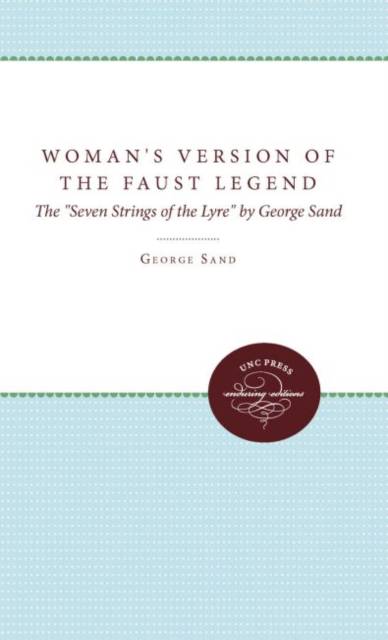
En raison d'une grêve chez bpost, votre commande pourrait être retardée. Vous avez besoin d’un livre rapidement ? Nos magasins vous accueillent à bras ouverts !
- Retrait gratuit dans votre magasin Club
- 7.000.000 titres dans notre catalogue
- Payer en toute sécurité
- Toujours un magasin près de chez vous
En raison de la grêve chez bpost, votre commande pourrait être retardée. Vous avez besoin d’un livre rapidement ? Nos magasins vous accueillent à bras ouverts !
- Retrait gratuit dans votre magasin Club
- 7.000.0000 titres dans notre catalogue
- Payer en toute sécurité
- Toujours un magasin près de chez vous
A Woman's Version of the Faust Legend
The Seven Strings of the Lyre
George Sand
Livre broché | Anglais
60,95 €
+ 121 points
Description
George Sand's The Seven Strings of the Lyre is a philosophical play written in poetic prose and never intended for perfomance on stage. Completed in 1838 during the early stages of Sand's romantic involvement with Frederic Chopin, it is one of the very few treatments of the Faust legend by a woman. George Kennedy offers the first English translation of this work, along with an introduction that places the play in its philosophical and literary context.
The Seven Strings of the Lyre is Sand's response to Goethe's Faust and a reflection of her views of music as developed in conversations with Chopin and Franz Liszt. Sand, unlike so many of her contemporaries, saw Goethe as a less-than-ideal poet. She criticized him for lacking "enthusiasm, belief, and passion," and she faulted him for being a proponent of the art-for-art's-sake movement, which Sand deplored for its lack of social conscience.
Sand's play describes the efforts of Mephistopheles to win the soul of Albertus, a teacher of philosophy and descendant of Faust. Regarding Goethe's Mephistopheles as insufficiently wicked, Sand conjures up a devil truly worthy of the epithet. For Faust, whom she considered too cold, Sand substitues the more emotional Albertus, whose despair that life and love have passed him by in his devotion to philosophy makes him vulnerable to the machinations of the devil. And in place of Goethe's village girl, Marguerite, or the dangerous Helen of the earlier Faust legend, Sand creates the angelic Helen, who awakens Albertus's love and teaches him the emotional and spiritual truths he had never learned from books.
Richly philosophical and deeply romantic, the play is a reaction against eighteenth-century rationalism. It asserts the existence of some higher truth to be foud in music, poetry, and a sympathetic response to nature, but it also, contrary to the doctrine of art for art's sake, demands social responsibility from the artist. Sand believed that the arts should lead society to an awareness of truth, freedom, and the meaning of life, and The Seven Strings of the Lyre is an attempt to dramatize this belief.
Originally published in 1989.
A UNC Press Enduring Edition -- UNC Press Enduring Editions use the latest in digital technology to make available again books from our distinguished backlist that were previously out of print. These editions are published unaltered from the original, and are presented in affordable paperback formats, bringing readers both historical and cultural value.
The Seven Strings of the Lyre is Sand's response to Goethe's Faust and a reflection of her views of music as developed in conversations with Chopin and Franz Liszt. Sand, unlike so many of her contemporaries, saw Goethe as a less-than-ideal poet. She criticized him for lacking "enthusiasm, belief, and passion," and she faulted him for being a proponent of the art-for-art's-sake movement, which Sand deplored for its lack of social conscience.
Sand's play describes the efforts of Mephistopheles to win the soul of Albertus, a teacher of philosophy and descendant of Faust. Regarding Goethe's Mephistopheles as insufficiently wicked, Sand conjures up a devil truly worthy of the epithet. For Faust, whom she considered too cold, Sand substitues the more emotional Albertus, whose despair that life and love have passed him by in his devotion to philosophy makes him vulnerable to the machinations of the devil. And in place of Goethe's village girl, Marguerite, or the dangerous Helen of the earlier Faust legend, Sand creates the angelic Helen, who awakens Albertus's love and teaches him the emotional and spiritual truths he had never learned from books.
Richly philosophical and deeply romantic, the play is a reaction against eighteenth-century rationalism. It asserts the existence of some higher truth to be foud in music, poetry, and a sympathetic response to nature, but it also, contrary to the doctrine of art for art's sake, demands social responsibility from the artist. Sand believed that the arts should lead society to an awareness of truth, freedom, and the meaning of life, and The Seven Strings of the Lyre is an attempt to dramatize this belief.
Originally published in 1989.
A UNC Press Enduring Edition -- UNC Press Enduring Editions use the latest in digital technology to make available again books from our distinguished backlist that were previously out of print. These editions are published unaltered from the original, and are presented in affordable paperback formats, bringing readers both historical and cultural value.
Spécifications
Parties prenantes
- Auteur(s) :
- Editeur:
Contenu
- Nombre de pages :
- 200
- Langue:
- Anglais
Caractéristiques
- EAN:
- 9780807857397
- Date de parution :
- 01-05-10
- Format:
- Livre broché
- Format numérique:
- Trade paperback (VS)
- Dimensions :
- 140 mm x 216 mm
- Poids :
- 258 g

Les avis
Nous publions uniquement les avis qui respectent les conditions requises. Consultez nos conditions pour les avis.






